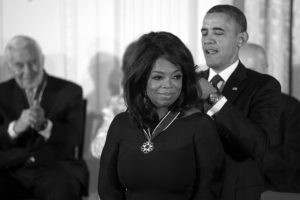Following the recent accusations of sexual harassment and abuse in Hollywood, as well as many other sectors of American society, actors and actresses spoke out in a united protest at the televised January 7th Golden Globe Awards and the January 28th Grammy Awards. These events were the first major award ceremonies since the sexual assault allegations surfaced against Hollywood’s top producers, actors, and directors, precipitating #MeToo and the TimesUp movement.
The TimesUp movement was initiated on January 1, 2018 by hundreds of female Hollywood celebrities like Reese Witherspoon and Oprah Winfrey in response to the recent exposure of Harvey Weinstein and other Hollywood executives.

TimesUp aims to fight sexual harassment within the workplace through widespread exposure. The movement looks to create support for and solidarity with people who have suffered sexual harassment and abuse within their workplace. BetterBrave, one of the support resources listed for victims on the TimesUp website, is an anti-workplace sexual harassment organization that was founded in San Francisco by Grace Choi and Tammy Cho in 2017. Choi explained that “the TimesUp movement has put sexual harassment in the spotlight, making incredible strides in opening up conversations that were long overdue.”
On January 1st, TimesUp was announced in the New York Times with the following initiatives in their efforts to end sexual harassment. The initiatives in the letter signed by hundreds of female artists and producers include:
1. A $13-million legal defense fund, administered by the National Women’s Law Center, to support lower-income women seeking justice for sexual harassment and assault in the workplace
2. Advocating for legislation to punish companies that tolerate persistent harassment
3. A movement toward gender parity in studio and talent agencies
4. A request for all people attending the 75th Golden Globe Awards to wear black on the red carpet and speak out to end sexual harassment and assault
Many celebrities have used award shows to spark social change in their speeches and interviews, such as Susan Sarandon in her speech on AIDS in 1993, and, more recently, Leonardo DiCaprio in his Best Actor speech regarding climate change. However, this is the first time that a large percentage of attendees have supported the same political movement at award ceremonies.
During the Golden Globes, many stars wore black or even used TimesUp pins to express their solidarity with the movement. Stars like Natalie Portman and Debra Messing used their airtime during interviews and while announcing the awards to take jabs at the industry for a lack of equal pay. Most notably, Oprah Winfrey used her acceptance speech for the Cecil B. DeMille Award for Lifetime Achievement to recognize working class women who have suffered assault and abuse, mentioning particularly Recy Taylor. Winfrey ended her speech assuring that there are men and women “fighting hard to make sure that they become the leaders who take us to the time when nobody ever has to say, ‘Me too’ again.”
Following the movement’s success at the Golden Globes, Meg Harkins and Karen Rait, both vice presidents of the American entertainment company RocNation, assembled a group of the music industry’s top executives the Monday before the Grammys to decide how to show their solidarity for the TimesUp movement during the ceremony. The group decided on wearing white rose boutonnieres to pay homage to suffragettes, who wore white during their protests. Although many artists saw the protest at the Grammys as a success for the movement, the awards program came under fire due to comments made by the Grammys’ Chief, Neil Portnow. When asked about the lack of female winners, Portnow told reporters that women need to “step up,” sparking the Twitter hashtag “#GrammysSoMale.”
There is tremendous pressure on the 90th Annual Academy Award Ceremony, coming up on March 4th, to further the work of empowering the unrecognized, disempowered and abused in the industry. The Academy will look to redeem itself from last year’s “#OscarsSoWhite” controversy, which criticized the lack of people of color amongst its voters, nominees, and winners.







